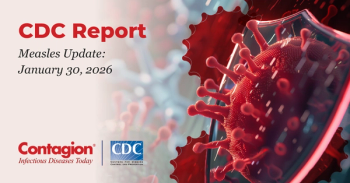The Centers for Disease Control and Prevention (CDC) announced its recommendations for the 2024 immunization schedule for adults 19 years or older and it has undergone significant vaccine-specific changes. Specifically, the Advisory Committee on Immunization Practices (ACIP) made notable updates including new and revised recommendations for respiratory syncytial virus vaccines (RSV), influenza vaccines, COVID-19 vaccines, inactivated poliovirus vaccine (IPV), and Mpox vaccine. Additionally, the schedule now includes recommendations for meningococcal serogroups A, B, C, W, and Y pentavalent vaccine (MenACWY-TT/MenB-FHbp). Any references to meningococcal serogroups A, C, W, and Y polysaccharide diphtheria toxoid conjugate vaccine (MenACWY-D, Menactra) have been removed, as this product is no longer distributed in the United States.
Furthermore, the changes encompass clarification of recommendations for hepatitis A (HAV), hepatitis B (HBV), human papillomavirus vaccine (HPV), measles, mumps, and rubella vaccine (MMR), pneumococcal vaccines, and tetanus, diphtheria, and pertussis vaccine (Tdap).
ACIP introduced a new detailed routine vaccination for RSV; maternal RSV vaccination during pregnancy, and a shared clinical decision voted to recommend that adults aged ≥60 years may receive a single dose of an RSV vaccine.
“RSV vaccines have demonstrated moderate to high efficacy in preventing RSV-associated lower respiratory tract disease and have the potential to prevent substantial morbidity and mortality among older adults; post-marketing surveillance will direct future guidance,” according to the CDC. 2
Recommendation Vaccinations for Ages 19 Years or Older
According to CDC, these are recommended vaccinations for adults who meet age requirements, lack documentation of vaccination, or lack evidence of immunity
- COVID-19: All adults are now recommended to receive at least one dose of the updated (2023–2024 Formula) COVID-19 vaccine. Recommendations may vary based on vaccination history, immunocompromised status, and the vaccine used.
- HAV: Any person who is not fully vaccinated and requests vaccination.
- HBV: 2, 3, or 4 doses depending on vaccine or condition.
- HPV: 2 or 3 doses depending on age at initial vaccination or condition. Recommended based on shared clinical decision-making 27 through 45 years.
- Influenza: 1 dose annually. Persons with a history of egg allergy can be vaccinated with any influenza vaccine.
- MMR: 1 or 2 doses depending on indication (if born in 1957 or later).
- Meningococcal: All references to Menactra were removed because this product is no longer distributed in the United States.
- Mpox: Risk factors for routine Jynneos vaccination are listed, with additional information on use in healthcare providers and pregnant individuals.
- Poliovirus: The completion of the 3-dose IPV primary vaccination series for unvaccinated or incompletely vaccinated adults. A one-time IPV booster dose recommendation for increased exposure risk.
- RSV: A new detailed routine vaccination, maternal RSV vaccination during pregnancy, and shared clinical decision-making for persons aged ≥60 years.
- Tdap: 1 dose of Tdap, then Td or Tdap booster every 10 years
- Var:2 doses(if born in 1980 or later)
3 Key Takeaways
- The CDC launched the 2024 immunization schedule for adults, introducing notable updates in recommendations for various vaccines, including RSV, influenza, COVID-19, IPV, and Mpox. The schedule now includes recommendations for the meningococcal pentavalent vaccine.
- The ACIP introduced a detailed routine vaccination for RSV, emphasizing maternal RSV vaccination during pregnancy.
- A shared clinical decision supports adults aged ≥60 years receiving a single dose of an RSV vaccine, highlighting its potential to prevent morbidity and mortality in older adults.
Contradictions and Precautions
When a contraindication is present, a vaccine should not be administered. Contraindications to vaccination refer to conditions in recipients that increase the risk of serious adverse reactions, warranting the avoidance of vaccine administration. While most contraindications are temporary, allowing vaccinations later, they should not be administered when the contraindication is present. Contraindications also include Severe Combined Immunodeficiency (SCID) disease and a history of intussusception, both warranting avoidance of rotavirus vaccines. It's important to note that certain conditions may be misperceived as contraindications, leading to unnecessary deferment of vaccination.
A precaution in vaccination refers to a recipient condition that may increase the risk of serious adverse reactions, cause diagnostic confusion, or compromise vaccine-induced immunity. The presence of moderate or severe acute illness, with or without fever, is a precaution for all vaccines. Vaccination is deferred for those with such illnesses to avoid confusion between the illness and the vaccine’s adverse effects.
The City of Philadelphia’s health department reported there has been a total of 9 confirmed cases of measles associated with a new outbreak stemming from last month.3
This phenomenon of people forgoing vaccines for preventable diseases is vexing, and measles certainly falls into this category. People choosing to not take safe and efficacious vaccines like MMR has become an issue. The CDC says only about 3 in 100 people will contract measles after full vaccination and being exposed to a person who has the disease. This means measles vaccination has a 97% efficacy.3
Stay informed and follow the updated guidelines for a comprehensive approach to adult immunization. For information about vaccination in the setting of a vaccine-preventable disease outbreak, contact your state or local health department.
References
- Murthy N, Wodi AP, McNally VV, Daley MF, Cineas S. Advisory Committee on immunization practices recommended immunization schedule for adults aged 19 years or older — United States, 2024. Morb Mortal Wkly Rep 2024;73:11–15. DOI: http://dx.doi.org/10.15585/mmwr.mm7301a3\
- Melgar M, Britton A, Roper LE, et al. Use of respiratory syncytial virus vaccines in older adults: recommendations of the Advisory Committee on Immunization Practices—United States, 2023. Morb Mortal Wkly Rep 2023;72:793–801. https://doi.org/10.15585/mmwr.mm7229a4 PMID:37471262
- Parkinson J. CDC ACIP Votes to recommend updated mRNA COVID-19 vaccines. Contagion Live. Published September 12 2023. Accessed January 19 2024. https://www.contagionlive.com/view/cdc-acip-votes-to-recommend-updated-mrna-covid-19-vaccines
- ACIP Contraindications guidelines for immunization. CDC. Published August 1 2023. Accessed January 19, 2024. https://www.cdc.gov/vaccines/hcp/acip-recs/general-recs/contraindications.html#.

































































































































